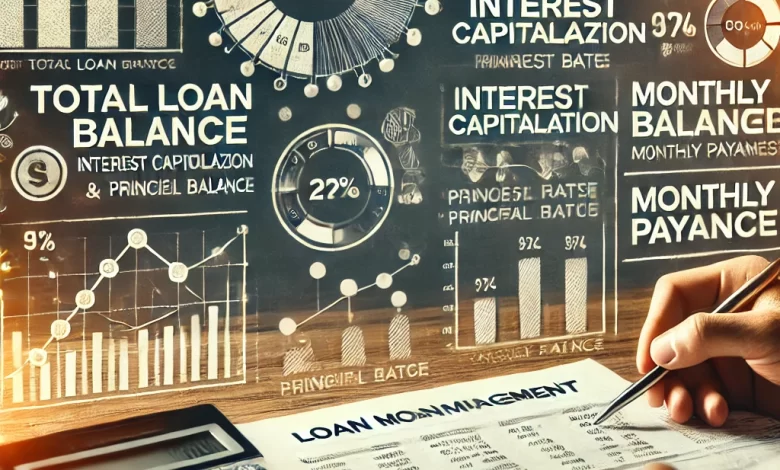What Increases Your Total Loan Balance? Key Factors to Understand

Managing loans effectively requires understanding what can impact your total loan balance over time. Whether it’s a student loan, personal loan, or mortgage, borrowers often find their loan balances increasing unexpectedly. This article will explore the factors that can increase your total loan balance, including interest, repayment issues, and fees, to help you avoid unnecessary debt.
See Article Content
- 1 1. Understanding Your Principal Balance and Unpaid Interest
- 2 2. Interest Capitalization: A Key Reason for Balance Increases
- 3 3. Variable Interest Rates and Loan Balance Increases
- 4 4. Making Minimum Payments: A Long-Term Balance Problem
- 5 5. Loan Repayment Plans and Extended Terms
- 6 6. Missed Payments and Loan Default
- 7 7. Factors That Can Increase Your Total Loan Balance
- 8 8. Strategies to Prevent Your Loan Balance from Increasing
- 9 Conclusion: Manage Your Loan Balance Wisely
1. Understanding Your Principal Balance and Unpaid Interest
Before discussing what increases your total loan balance, it’s essential to understand two key components of a loan:
- Principal Balance: The original amount borrowed that remains unpaid.
- Unpaid Interest: Interest that accrues on the principal balance but remains unpaid.
When you make a loan payment, part of it goes toward the interest, and the rest reduces the principal. If you fail to pay enough to cover the interest, the unpaid portion can add to the loan, increasing the total amount you owe.
2. Interest Capitalization: A Key Reason for Balance Increases
Interest capitalization occurs when unpaid interest is added to the principal balance. This increases the total loan balance because you start paying interest on a larger amount.
- How It Works: When you defer payments during a grace period or forbearance, interest continues to accrue. Once the period ends, that unpaid interest capitalizes and becomes part of the loan’s principal.
- Example: If you owe $10,000 and accrue $500 in unpaid interest, your new balance becomes $10,500 after capitalization, and you will be charged interest on this higher amount.
To avoid this, try to pay the interest during deferment or forbearance periods.
3. Variable Interest Rates and Loan Balance Increases
Loans with variable interest rates can cause unpredictable increases in your total loan cost. Unlike fixed rates, variable rates change based on market conditions, directly affecting your loan balance:
- Rising Rates: When rates increase, the amount of interest you pay grows, leading to larger monthly payments.
- Impact on Balance: If you only make the minimum payment, rising interest rates can cause your loan balance to grow instead of shrink.
To manage this risk, consider refinancing your loan to lock in a fixed interest rate.
4. Making Minimum Payments: A Long-Term Balance Problem
Making the minimum payment might seem manageable in the short term, but it can lead to significant increases in your loan balance over time:
- Why It Happens: Minimum payments often barely cover interest, leaving the principal untouched. The loan continues to accrue interest, which increases the total loan cost.
- Example: On a $5,000 personal loan with a high interest rate, minimum payments may only cover a fraction of the interest each month, causing the balance to grow.
Always aim to pay more than the minimum to reduce your total loan cost.
5. Loan Repayment Plans and Extended Terms
While extended repayment plans offer smaller monthly payments, they can significantly increase your total loan balance over time:
- Extended Terms: Longer repayment periods mean you pay interest for a longer duration, increasing the total loan cost.
- Impact on Student Loans: Federal student loan repayment plans, such as income-driven repayment, lower payments temporarily but extend the loan term, causing the balance to rise.
Consider balancing affordability with a plan that reduces interest costs over time.
6. Missed Payments and Loan Default
Missing payments or defaulting on a loan can drastically increase your loan balance:
- Late Fees and Penalties: Lenders often charge fees for missed or late payments, which add to your principal balance.
- Accumulated Interest: While in default, interest will continue to accrue, further inflating the balance.
To prevent this, prioritize loan payments and communicate with your lender to discuss options, such as deferment or restructuring.
7. Factors That Can Increase Your Total Loan Balance
To summarize, here are the main factors that can increase your total loan balance:
- Interest Capitalization: Unpaid interest added to the principal.
- Variable Interest Rates: Rising rates increase the cost of borrowing.
- Minimum Payments: Paying less than the accrued interest causes the balance to grow.
- Extended Repayment Plans: Longer terms mean more interest paid.
- Missed Payments: Late fees and interest accumulation inflate the loan.
- Grace Periods or Deferments: Accruing interest capitalizes once repayment resumes.
Understanding these factors will help you make informed decisions and manage your loan more effectively.
8. Strategies to Prevent Your Loan Balance from Increasing
If you want to keep your loan under control, follow these tips:
- Pay More Than the Minimum: Reducing the principal balance minimizes interest charges.
- Monitor Variable Rates: Refinance to a fixed rate if rates are rising.
- Avoid Deferment if Possible: Pay interest during grace or deferment periods to avoid capitalization.
- Stay on Track with Payments: Set up automatic payments to avoid late fees and penalties.
- Choose the Right Repayment Plan: Opt for a plan that balances monthly payments with overall cost savings.
By staying proactive, you can minimize unnecessary increases in your total loan balance.
Conclusion: Manage Your Loan Balance Wisely
Understanding the factors that contribute to a rising total loan balance is essential for managing debt effectively. Whether it’s through avoiding interest capitalization, monitoring variable interest rates, or making more than the minimum payment, staying informed and proactive can save you significant money over time.
From student loans to personal loans, knowing how loans continue to accrue interest and impact your finances empowers you to take control of your financial future. By following the strategies outlined above, you can keep your loan balance in check and work toward debt freedom.
If this article was helpful to you, don’t miss the next one—we think you’ll enjoy it! What Does It Mean to Coordinate Respective Legislative Strategies?






